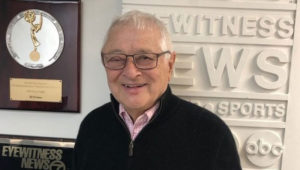TV stations could be stuck with a big moving bill when the FCC rearranges the TV dial following the broadcast incentive auction of wireless spectrum planned for first quarter 2016. Congress set aside $1.75 billion in the law to help stations pay for the cost of moving from one frequency to another. But that may fall short by nearly a billion dollars if as many as 95% of TV stations end up being moved onto a new channel, says the NAB.
Comcast said in a blog post Wednesday that it now expects the FCC’s review to finish in the middle of the year. It had predicted the deal would close in early 2015. The FCC has delayed its review due to a court case that is pending.
The GOP continued to chip away at the FCC’s open Internet order Tuesday, using the commission budget as its latest cudgel. At a House appropriation subcommittee hearing, members heard another round of testimony from the dueling duo of net neutrality: chairman Tom Wheeler and GOP commissioner Ajit Pai. It was the fourth hearing in seven days during which Republicans have put the FCC’s order to reclassify Internet service as a utility under intense questioning.
 Comcast EVP David Cohen says the bigger-than-expected results of the FCC’s AWS spectrum auction has NBCU — among many other broadcasters — considering participating in the upcoming incentive auction. However, that interest might be mitigated by uncertainty over how much spectrum will be needed to make a strong push to mobile devices.
Comcast EVP David Cohen says the bigger-than-expected results of the FCC’s AWS spectrum auction has NBCU — among many other broadcasters — considering participating in the upcoming incentive auction. However, that interest might be mitigated by uncertainty over how much spectrum will be needed to make a strong push to mobile devices.
On Monday, USTelecom — a group that includes some of the nation’s largest Internet providers — filed suit in Washington, while Alamo Broadband sued the FCC in New Orleans. The court filings kick-start a legal effort to overturn the FCC’s regulations, passed in February, that aim to keep Internet providers from speeding up, slowing down or blocking Web traffic.
Welcome To HD: FCC’s Indecency Course
While it’s clear the FCC didn’t have any qualms in pursuing the case that resulted in a $325,000 fine against WDBJ Roanoke, Va., it does raise practical questions for broadcasters in less unusual circumstances. For example, might the FCC find a station airing crowd shots at a live sporting event guilty of willful indecency because its monitoring equipment was not large enough to detect that a few members of the crowd were being over-enthusiastic in trying to draw the attention of the kiss-cam?
Schurz’s WDBJ Draws $325K Indecency Fine
After an investigation, the FCC says the CBS Roanoke, Va., affiliate during a July 2012 newscast apparently aired “extremely graphic and explicit sexual content, specifically a video image of a hand stroking an erect penis.”
FCC chairman Tom Wheeler will be back in the witness chair this week, facing two more committees that intend to keep up the heat following the commission’s 3-2 party-line vote to treat Internet service as a utility.
Nets, Affils Move Online Not Without Strife

FCC Commissioner Pai started it; Chairman Wheeler committed to it; now Congress is getting behind the effort to revamp FCC spectrum auction rules that facilitate small business participation in wireless auctions. Rep. Frank Pallone Jr., ranking member of the House Energy and Commerce Committee, introduced a draft discussion bill directing the FCC to update its spectrum auction rules that are designed to help small businesses and encourage competition.
Some key Senate Democrats are giving signals that they may join with Republicans in support of bipartisan legislation to replace federal net neutrality regulations. Lawmakers have a steep hill to climb to reach any compromise on the issue, which so far has created a sharp divide between Democrats and Republicans. But the prospect that a lawsuit will strike down the rules or that a future FCC will undo them might be prompting Democrats to renew talks with GOP lawmakers about a possible bill.
A petition before the FCC would make it easier for political candidates to get their ads on TV stations in the weeks before an election. Candidates are already guaranteed the lowest rate for such advertising. Under this new measure, political ads would be given favorable treatment over commercial ads.
Top White House aides met with the head of the FCC at least nine times while it was working on strong Internet regulations without telling the public, House Republicans revealed today. Agency head Tom Wheeler defended the lack of disclosure about the meetings during a hearing in the House Oversight Committee on Tuesday, claiming that the tough new net neutrality rules never came up in those talks.
The FCC’s database designed to keep unlicensed Wi-Fi devices from knocking broadcast TV signals off the air has a big flaw: it’s self-reported, hence some bogus entries. The flaws so far are fairly minor — particularly since there are only about 600 or so actual devices in use right now — but if it isn’t fixed, the system could become unworkable down the road when more people try to make use of the unlicensed airwaves.
Today, the House Oversight and Government Reform Committee will convene the first hearing on the subject since the FCC voted last month to put the Internet in the same regulatory camp as the telephone, using the 1934 Communications Act. This means that whenever a company provides an Internet connection, it has to act in the public interest and not do anything considered “unjust or unreasonable.”
The FCC on Friday officially stopped its so-called “shot clock” on its reviews of Comcast’s proposed $45-billion takeover of Time Warner Cable, as well as the agency’s separate review of AT&T’s bid to take over DirecTV. Both were scheduled to expire in late March.
FCC Chairman Tom Wheeler will appear before five congressional committees over the next two weeks, facing off with Republicans over his net neutrality plan.
The FCC today released the full text of its recently approved net neutrality rules, which face legal challenges and congressional pushback. The rules alone run for 313 pages. Including the statements of the five commissioners, the document hits 400 pages, with the two GOP dissents taking up the final 79 pages. The rules were approved two weeks ago on a 3-2 vote and have proved controversial throughout the yearlong rule-making process. The FCC is sending the order to the Federal Register, and it will take effect 60 days after publication.
FCC Sets New Auction Seminar Locations
The FCC continues to take its show on the road, announcing incentive auction seminars for TV broadcasters in several new cities. At these seminars, FCC officials meet with TV broadcasters in a general meeting to outline the mechanics of the proposed incentive auction to reclaim a portion of the TV band to be resold to wireless users for wireless broadband purposes, and the subsequent “repacking” when remaining TV stations will be assigned channels on which to operate in a smaller TV band.
New Closed Captioning Rules On March 16
As a quick refresher, the FCC adopted closed caption quality standards and technical compliance rules to ensure video programming is fully accessible to individuals who are deaf or hard of hearing. In April 2014, the FCC announced a series of effective dates for the requirements, and in December 2014 it extended a Jan. 15, 2015, deadline for compliance with certain rules to March 16. Here’s a rundown of those requirements.
The broadcaster tells the FCC that “it is clear that not all LPTV stations will find a new home after the spectrum incentive auction and subsequent repacking of full-power and Class A stations. However, those LPTV stations that do secure a channel and that demonstrate a commitment to serving their local communities should be given the opportunity to apply for Class A status and secure a permanent channel in the post-auction environment.”
The Other Side Of The Net Neutrality Coin

The Expanding Opportunities for Broadcasters Coalition says its method of calculating opening bids for next year’s spectrum auction significantly boosts the value of spectrum and broadcasters should get behind it.
The trade group says the FCC should impose the same basic regulations on online video distributors as they do on MVPDs. Among other things, that would include retrans and must-carry obligations.
The FCC has renewed the licenses of three TV stations held by large broadcast groups, rejecting petitions to deny filed by a citizen’s organization arguing that the children’s educational and informational programming run by these stations was not sufficiently educational or informational to meet FCC requirements. The licensees were able to present evidence that these programs did meet the requirements. However, the FCC warned stations to be careful in their assessments of the educational nature of children’s programs.
Net Neutrality’s Biggest Winner: Netflix
Netflix has acted to subtly reframe the debate in Washington over the FCC’s proposed Title II public utility regulation of the Internet in the name of “net neutrality.” Netflix, known for its innovation in reshaping the entertainment industry, worked to add unprecedented regulations to new net neutrality rules that will cement its power, eliminate its current costs and, in turn, pass those costs onto all Internet users to benefit its bottom line.
Amid heated allegations that he has allowed his agency to be a puppet for the White House, the head of the FCC has agreed to testify before the House Oversight Committee next month. Tom Wheeler, who initially declined to appear before the panel this week, will testify on the morning of March 17, committee spokeswoman M.J. Henshaw said.
Broadcasters Benefit From Net Neutrality

Yesterday, the FCC agreed to rules that would ban service providers from creating Internet fast lanes. Here’s a look at what Net neutrality means and what’s likely to happen next:
The FCC voted today along party lines to approve sweeping changes to how it regulates the Internet, capping more than a year of noisy debate that sparked millions of public comments and drew the attention of President Barack Obama and congressional leaders. AT&T has already threatened a legal challenge.
The FCC will vote today on whether to put Internet service in the same regulatory camp as your telephone. Some critics talk about the plan like it’s a government takeover of your Netflix account. Supporters say it’ll protect the status quo without price controls or new taxes. But the lobbyists and politicians aren’t telling the whole story. Here’s a look at some of the questionable rhetoric in the Nnet neutrality debate.
Two prominent House committee chairs are “deeply disappointed” in FCC Chairman Tom Wheeler for refusing to testify before Congress as “the future of the Internet is at stake.” Wheeler’s refusal to go before the House Oversight Committee today comes on the eve of the FCC’s vote on new Internet regulations pertaining to net neutrality. The committee’s chairman, Rep. Jason Chaffetz, and Energy and Commerce Committee Chairman Fred Upton criticized Wheeler and the administration for lacking transparency on the issue.
Local Broadcast TV’s Integral Role In Culture
 Robert Kenny, director of public affairs for TVfreedom.org: “The ability of local broadcast TV stations to serve our nation’s local communities rests on the existence of viable revenue streams that Congress has traditionally made available to promote local television service. Compromising the ability of local TV stations to compete for such revenue streams would create a regulatory imbalance that would threaten the unique benefits of localism and ultimately jeopardize the future of local broadcast TV.”
Robert Kenny, director of public affairs for TVfreedom.org: “The ability of local broadcast TV stations to serve our nation’s local communities rests on the existence of viable revenue streams that Congress has traditionally made available to promote local television service. Compromising the ability of local TV stations to compete for such revenue streams would create a regulatory imbalance that would threaten the unique benefits of localism and ultimately jeopardize the future of local broadcast TV.”
The FCC is poised on Thursday to give tech companies their latest in a series of victories in Washington, one that will see strong new rules applied to Internet providers such as Verizon and Cablevision. The decision marks a key achievement for tech firms after a months-long campaign against some of the communications industry’s most sophisticated lobbying operations. And it holds major implications for the way consumers experience the Internet.
Mignon Clyburn, one of three Democrats on the FCC, wants to narrow the scope of new Net neutrality rules that are set for a vote on Thursday. She has asked Chairman Tom Wheeler to roll back some of the restrictions before the full commission votes on them, FCC officials say.
In comments filed with the FCC last Friday, NAB said that the FCC’s best chance of matching the $40 billion success of the AWS-3 auction is by keeping the “rules simple, reducing the amount of government tinkering in the … process Congress envisioned and striving for a framework that embraces the auction’s enormous potential.”
TV Auction Moving, But Could Still Be Derailed

Bringing The FCC’s Contest Rule Up To Date
It is an unusual occasion indeed when the FCC offers to revise its rules to provide regulatory relief to both television and radio stations. Yet that is precisely what the FCC proposed in a Notice of Proposed Rulemaking to update its station-conducted contest rule to allow broadcasters to post contest rules online rather than broadcast them. As the proposal now stands, stations would no longer need to broadcast the contest rules if they instead announce the full website address where the rules can be found each time they discuss the contest on-air.
Net-Neutrality Is FCC Independence Battle
 Former FCC Chairman Reed Hundt: “Ever since the Internet exploded into our lives like the big bang, Republicans and Democrats have sometimes disagreed about the role of government with respect to this new global medium. Partisan conflict flared this month when FCC Chairman Tom Wheeler proposed a “net-neutrality” rule favored by President Obama. The disagreement goes well beyond the matter of the rule itself. At issue is the meaning of independence for New Deal and progressive-era regulatory agencies such as the FCC.”
Former FCC Chairman Reed Hundt: “Ever since the Internet exploded into our lives like the big bang, Republicans and Democrats have sometimes disagreed about the role of government with respect to this new global medium. Partisan conflict flared this month when FCC Chairman Tom Wheeler proposed a “net-neutrality” rule favored by President Obama. The disagreement goes well beyond the matter of the rule itself. At issue is the meaning of independence for New Deal and progressive-era regulatory agencies such as the FCC.”


































